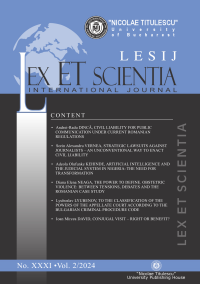NEW FORMS AND PERSPECTIVES ON RES JUDICATA IN CRIMINAL MATTERS
NEW FORMS AND PERSPECTIVES ON RES JUDICATA IN CRIMINAL MATTERS
Author(s): Andrei Zarafiu, Giulia ȘologonSubject(s): Law, Constitution, Jurisprudence, Constitutional Law, Criminal Law, Court case
Published by: Universitatea Nicolae Titulescu
Keywords: finality of judgments; res judicata; claim preclusion; non bis in idem; preliminary points of law;
Summary/Abstract: The fundamental principles of the due process in criminal matters compel the prosecution to ensure that an effective official investigation is carried out, which can identify criminal offences, ensuring that the perpetrators are held accountable. At the same time, the impartial administration of criminal justice requires the existence of a single trial, with due respect for the rights of the defender, in which the substantive truth is definitively established. It must be possible to review a court's decision exclusively by means of appeals, regulated by clear and precise rules, so as to establish a specific point in time when the final judgment that settles a criminal trial becomes final, after which the judge's ruling cannot be overturned. Res judicata is the power or force given by law to a final judgment to be enforced and to prevent a new prosecution for the same offence. This doctrine is based on two fundamental rules: a person can only be tried once for a criminal offence; the basis for the judgment is presumed to express the truth and must not be contradicted by another judgment. What legitimates res judicata is not so much the finality of the judgment as the truth which must underlie it, the truth which constitutes the basis, the rationale and the social and moral foundation of this effect of the judgment. This study is an analysis of res judicata, in terms of the content of the doctrine, its legal dimension, as well as the way in which it ensures the guarantee of a fair trial in order to establish the judicial truth. The article also examines the relationship between res judicata, res judicata and the non bis in idem principle. The way in which these three principles operate in the course of criminal proceedings helps to ascertain the particular effects of decisions not to refer to trial, decisions of the committing judge of the pre-trial chamber. At the same time, the study also takes into account the effects of the Constitutional Court Decision no. 102/2021 on the res judicata authority of judgments rendered by civil courts in preliminary points of law, as provided under Article 52 of the Code of Criminal Procedure.
Journal: LESIJ - Lex ET Scientia International Journal
- Issue Year: XXXI/2024
- Issue No: 2
- Page Range: 135-153
- Page Count: 19
- Language: English

